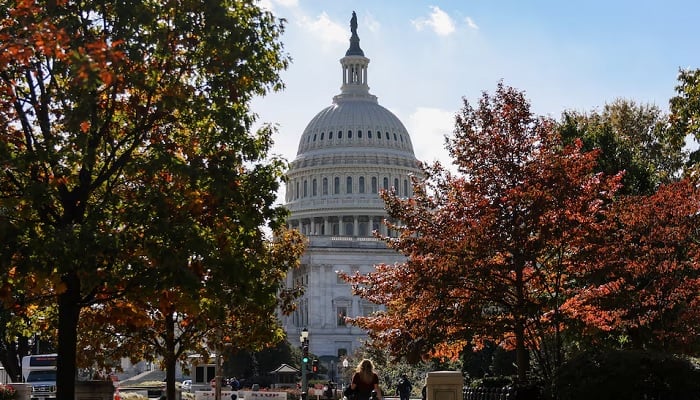
- House votes to advance funding package to end 43-day shutdown.
- Democrats oppose the package because of the lack of healthcare subsidies.
- Trump supports the package, which is likely to pass with support from conservatives.
A deal to end the longest government shutdown in U.S. history was approved by Congress on Wednesday, after the House of Representatives voted to restart halted food assistance, pay hundreds of thousands of federal workers and revive a hampered air traffic control system.
The Republican-controlled chamber approved the package by a 222-209 vote, and President Donald Trump’s support largely kept his party united in the face of vehement opposition from House Democrats, who are angry that a long standoff initiated by their Senate colleagues failed to secure a deal to extend federal health insurance subsidies.
The bill has already passed the Senate and the White House said Trump will sign it into law later Wednesday, ending the shutdown.
It would extend funding through Jan. 30, leaving the federal government on track to continue adding about $1.8 trillion a year to its $38 trillion debt.
“I feel like I’ve lived through an episode of Seinfeld. We just got through 40 days and I still don’t know what the plot was,” said Republican Rep. David Schweikert of Arizona, comparing Congress’s handling of the shutdown to the misadventures of a popular 1990s American sitcom.
“I really thought it would be like 48 hours: people will have their share, they’ll have a moment to have a tantrum, and we’ll get back to work.”
And he added: “What has happened now that anger is political?”
No promises on healthcare
The vote came eight days after Democrats won several high-profile elections that many in the party thought strengthened their chances of winning an extension of health insurance subsidies, which are set to expire at the end of the year. While the deal calls for a December vote on those subsidies in the Senate, President Mike Johnson has made no such promise in the House.
Democratic Rep. Mikie Sherrill, who last week was elected New Jersey’s next governor, spoke out against the funding bill in her final speech in the U.S. House of Representatives before resigning from Congress next week, encouraging her colleagues to take on the Trump administration.
“To my colleagues: Do not let this agency become a ceremonial red seal for an administration that takes food away from children and strips away health care,” Sherrill said.
“To the country: stand firm. As we say in the Navy, don’t give up the ship.”
There is no clear winner after the closure
Despite the recriminations, neither party appears to have won a clear victory. TO Reuters/The Ipsos poll released Wednesday found that 50% of Americans blamed Republicans for the shutdown, while 47% blamed Democrats.
The vote came on the Republican-controlled House’s first day of session since mid-September, a long recess aimed at putting pressure on Democrats. The House’s return also started the clock for a vote to release all unclassified records related to the late convicted sex offender Jeffrey Epstein, something Johnson and Trump have so far resisted.
Johnson on Wednesday swore in Democrat Adelita Grijalva, who won the September special election to fill the Arizona seat of her late father, Raúl Grijalva. She provided the final signature needed for a petition to force a House vote on the issue, hours after House Democrats released a new batch of Epstein documents.
That means that, after fulfilling its constitutional duty to keep the government funded, the House could once again be consumed by an investigation into Trump’s former friend, whose life and death in prison in 2019 have spawned countless conspiracy theories.
The funding package would allow eight Republican senators to seek hundreds of thousands of dollars in damages for alleged privacy violations stemming from the federal investigation of the Jan. 6, 2021, attack on the U.S. Capitol by Trump supporters.
It retroactively makes it illegal in most cases to obtain a senator’s phone data without disclosing it and allows those whose records were obtained to sue the Justice Department for $500,000 in damages, along with attorneys’ fees and other costs.



